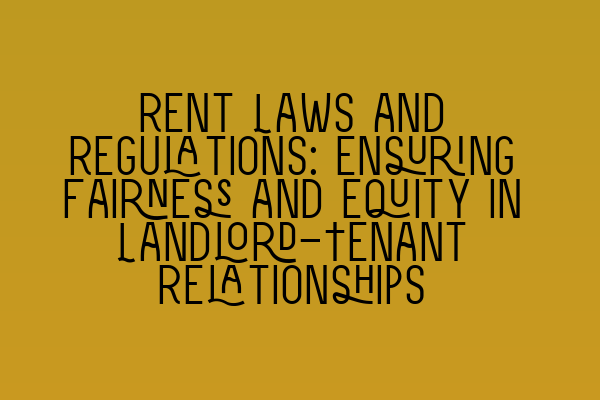Rent Laws and Regulations: Ensuring Fairness and Equity in Landlord-Tenant Relationships
Renting a property is a common practice in today’s society, with many individuals and families opting for this housing arrangement. However, it is crucial to have a clear understanding of the rent laws and regulations that govern these landlord-tenant relationships to ensure fairness and equity for both parties involved. In this blog post, we will explore the importance of rent laws, the rights and responsibilities of landlords and tenants, and how to navigate them effectively.
First and foremost, it is essential to recognize the significance of rent laws in protecting the interests of both landlords and tenants. These laws serve as a legal framework designed to establish a fair and balanced relationship between the two parties. They outline specific rights and obligations, providing a sense of security and stability for all involved.
For landlords, understanding and adhering to rent laws is crucial to protect their investments and ensure the smooth running of their properties. These laws outline guidelines for setting rent amounts, payment processes, and allowable reasons for eviction. By familiarizing themselves with these regulations, landlords can maintain a harmonious relationship with their tenants while avoiding potential legal pitfalls.
Tenants, on the other hand, benefit from rent laws that safeguard their rights and prevent exploitation. These laws prohibit discrimination based on factors such as race, gender, or disability, ensuring equal opportunities for all individuals seeking rental accommodations. Furthermore, rent laws establish clear guidelines for security deposits, rent increases, and maintenance responsibilities, protecting tenants from unjust treatment or unfavorable living conditions.
In order to navigate rent laws effectively, both landlords and tenants must be aware of their rights and responsibilities. Landlords should familiarize themselves with local and national regulations, ensuring that their rental agreements and practices align with legal requirements. This includes proper documentation of lease agreements, adherence to fair housing laws, and transparent communication regarding maintenance and repairs.
Tenants, similarly, should educate themselves on their legal rights and obligations to safeguard their interests. This includes understanding their lease agreement, knowing their rights in relation to rent increases and security deposits, and reporting any maintenance issues promptly. By being proactive and informed, tenants can protect themselves from potential disputes or unfair treatment.
It is also essential to seek professional advice when dealing with complex rent laws and regulations. Consulting with a solicitor experienced in property law can provide invaluable guidance and ensure compliance with legal requirements. A solicitor can help landlords draft legally sound lease agreements, assist with eviction processes when necessary, and provide advice on rent increases and maintenance obligations.
Similarly, tenants can benefit from legal advice when facing challenges with their landlords or rental agreements. If a dispute arises, consulting with a solicitor who specializes in tenant rights can help tenants navigate the legal landscape and seek a fair resolution. Legal professionals can provide insights into the specific laws that apply and offer guidance on how to proceed.
In summary, rent laws and regulations play a vital role in ensuring fairness and equity in landlord-tenant relationships. They establish clear guidelines for both parties, protecting their rights and responsibilities. By understanding and adhering to these laws, landlords and tenants can maintain a harmonious relationship, fostering a sense of trust and security. Seeking professional advice when needed can provide additional support and guidance in navigating the complexities of rent laws.
If you are preparing for the SQE (Solicitors Qualifying Examination) or looking for resources to enhance your legal knowledge, we recommend checking out the following related articles:
– SQE 1 Practice Exam Questions: Improve your preparation for the SQE 1 examination with our comprehensive practice exam questions.
– SQE 1 Practice Mocks FLK1 FLK2: Access practice mocks for the SQE 1 examination to enhance your performance and boost your confidence.
– SQE 2 Preparation Courses: Explore our SQE 2 preparation courses designed to help you succeed in this important stage of your legal career.
– SQE 1 Preparation Courses: Enhance your knowledge and skills with our SQE 1 preparation courses, tailored to meet your specific needs.
– SRA SQE Exam Dates: Stay updated on the latest SRA SQE exam dates to plan your study schedule effectively and ensure timely registration.
Remember, staying knowledgeable about rent laws and regulations is key to creating a fair and equitable landlord-tenant relationship. By following the guidelines outlined by these laws and seeking professional advice when necessary, both parties can enjoy a smooth and mutually beneficial experience.
